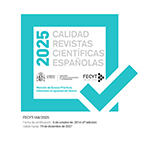Las identificaciones políticas en la “nueva derecha” española. Un análisis del caso de VOX desde un enfoque de lógicas
Resumen
En este artículo buscamos aportar a la caracterización del partido político español Vox, mediante un análisis del proceso de identificación en sus adherentes y activistas. En base a una serie de entrevistas en profundidad con adherentes de Vox, registros audiovisuales en redes sociales y observaciones de actividades proselitistas durante la campaña a la gobernación de la Comunidad de Madrid entre marzo y mayo de 2021, escrutaremos las lógicas social, política y fantasmática articuladas en la identificación voxita desde una perspectiva informada por la Teoría Política del Discurso y algunos elementos del psicoanálisis (Glynos y Howarth, 2007).
En función del análisis de las tres lógicas, plantearemos que el mensaje público de Vox interpela a sus adherentes sobre cuestiones concretas, promoviendo la pretensión de un sujeto pleno y libre. Éste está amenazado, de un lado, por nuevas demandas sociales que desafían el statu quo conservador nacionalista y tradicional, y frustrado, del otro, por la proliferación de desigualdades económicas y sociales. De este modo, a partir de esta exploración de la identificación voxita pretendemos contribuir dentro de la vasta bibliografía existente sobre este actor político que resalta la importancia de la identidad colectiva que Vox construye, o pretende construir, como un factor explicativo de su relativo auge en el escenario español. A su vez nos interesa aportar a la reflexión, mediante este caso específico, en el debate sobre las transformaciones de las dinámicas ideológicas contemporáneas.
Descargas
Descarga artículo
Licencia
La revista Política y Sociedad, para fomentar el intercambio global del conocimiento, facilita el acceso sin restricciones a sus contenidos desde el momento de su publicación en la presente edición electrónica, y por eso es una revista de acceso abierto. Los originales publicados en esta revista son propiedad de la Universidad Complutense de Madrid y es obligatorio citar su procedencia en cualquier reproducción total o parcial. Todos los contenidos se distribuyen bajo una licencia de uso y distribución Creative Commons Reconocimiento 4.0 (CC BY 4.0). Esta circunstancia ha de hacerse constar expresamente de esta forma cuando sea necesario. Puede consultar la versión informativa y el texto legal de la licencia.











